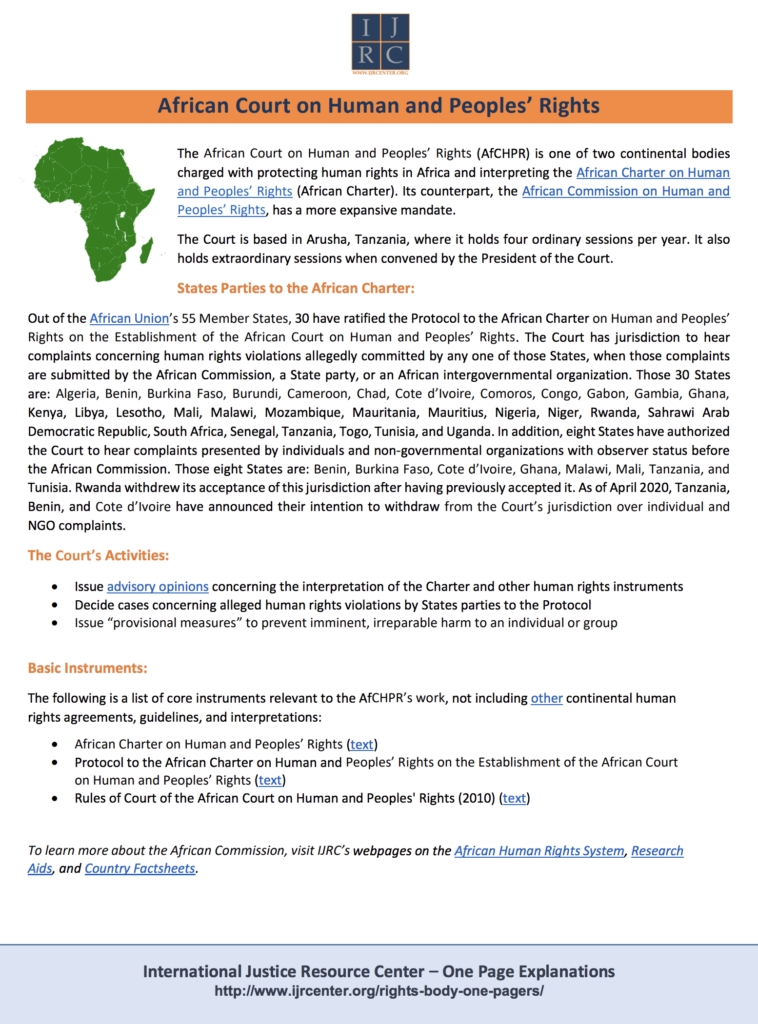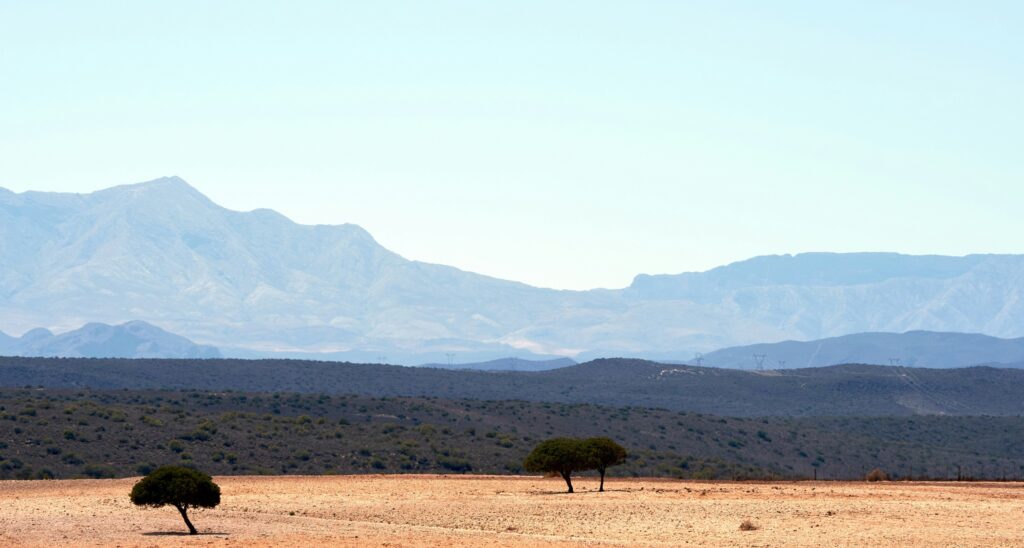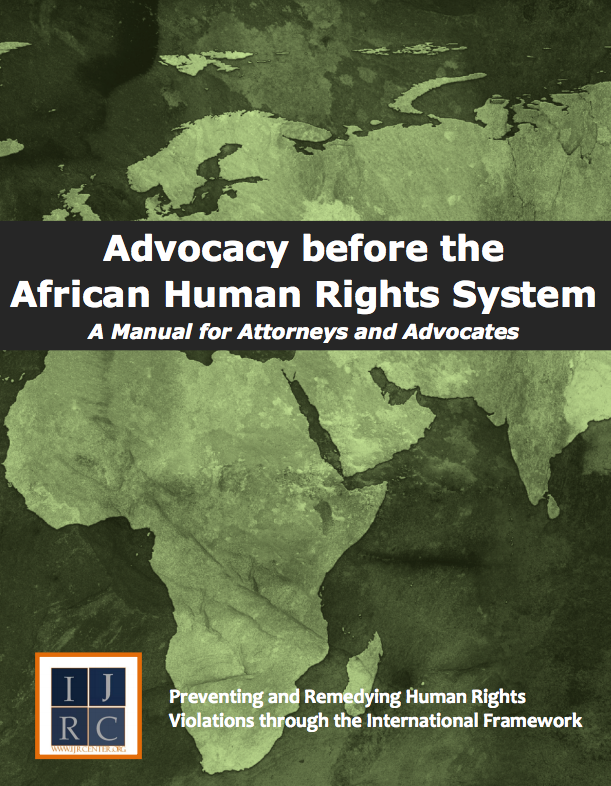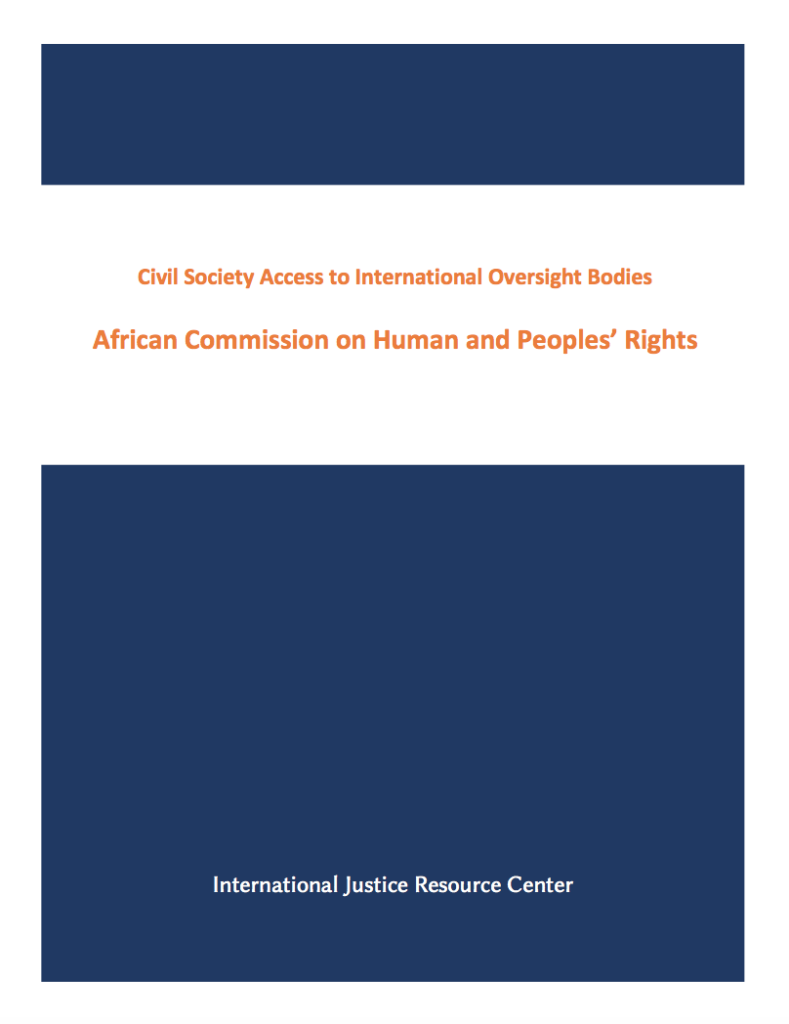African Human Rights Oversight Bodies
African Court on Human and Peoples’ Rights
Seat: Arusha, Tanzania Operating Since: 2006
The African Court on Human and Peoples Rights (AfCHPR) is a regional human rights tribunal with advisory and contentious jurisdiction concerning the interpretation and application of the African Charter on Human and Peoples’ Rights (“Banjul Charter”) and other instruments. Its jurisdiction extends to those States that have ratified the Protocol to the African Charter on Human and Peoples’ Rights on the Establishment of an African Court on Human and Peoples’ Rights. In addition to deciding cases, the Court may issue advisory opinions and adopt thematic reports.
More detailed information about the AfCHPR.
African Commission on Human and Peoples’ Rights
Seat: Banjul, The Gambia Operating Since: 1987
The African Commission on Human and Peoples’ Rights (ACHPR) promotes and protects human rights in the 54 Member States of the African Union that have ratified the African Charter on Human and Peoples’ Rights. Morocco rejoined the African Union in 2017, becoming its 55th Member State, but has not yet ratified the African Charter on Human and Peoples’ Rights. [IJRC]
More detailed information about the ACHPR.
African Committee of Experts on the Rights and Welfare of the Child
Seat: Maseru, Lesotho Operating Since: 2002
The African Committee of Experts on the Rights and Welfare of the Child (ACERWC) is charged with protecting human rights in Africa and interpreting the African Charter on the Rights and Welfare of the Child (ACRWC). Until December 2020, the ACERWC had been based in Addis Ababa, Ethiopia, but it relocated its headquarters to Lesotho following an agreement between the AU and Lesotho. The Committee generally holds biannual ordinary sessions at its headquarters. It is made up of 11 individuals elected by the Assembly of the African Union to serve for one term of five years.
More detailed information about the ACERWC.
Additional Oversight Bodies
COMESA Court of Justice
The COMESA Court of Justice is the judicial organ of a regional economic community, the Common Market for Eastern and Southern Africa (COMESA), and is charged with settling disputes arising under the COMESA Treaty between COMESA’s Member States, Secretary General, individuals, and corporations. The COMESA Court of Justice does not have general competence to hear individual complaints of alleged human rights violations.
More detailed information about the COMESA Court of Justice.
East African Court of Justice
The East African Court of Justice (EACJ) is an international court tasked with resolving disputes involving the East African Community and its Member States. The EACJ was established by Article 9 of the Treaty for the Establishment of the East African Community and is charged with interpreting and enforcing the treaty, which came into force on July 7, 2000. The East African Court of Justice does not have competence to hear individual complaints of alleged violations of human rights law, as such. The EACJ is based in Arusha, Tanzania.
More detailed information about the East African Court of Justice.
Economic Community of West African States Court of Justice
The ECOWAS Court of Justice is the judicial organ of the Economic Community of West African States (ECOWAS) and is charged with resolving disputes related to the Community’s treaty, protocols and conventions. The ECOWAS Community Court of Justice has competence to hear individual complaints of alleged human rights violations.
More detailed information about the ECOWAS Court of Justice.
Southern African Development Community Tribunal
The Southern African Development Community Tribunal was established under of the Treaty of the Southern African Development Community (SADC) in 1992, but was only inaugurated in November 2005. The SADC Tribunal is currently suspended.
More detailed information about the Southern African Development Community Tribunal.
The African Instruments
The Commission and Court are charged with interpreting and applying a number of regional human rights instruments, which include:
They also interpret the principles contained in the following non-treaty documents:
Additional Tools for Victims & Advocates
See IJRC’s publication Advocacy before the African Human Rights System: Manual for Attorneys and Advocates (2016) for detailed information on the System, its components, complaints procedure, and decisions.
Decisions of the African human rights bodies can be accessed on the websites of the Commission, Court, and ACERWC. However, the most effective tool for researching their caselaw is the Institute for Human Rights and Development in Africa’s Case Law Analyser. For additional research tools, see IJRC’s guide on Researching International Human Rights Law.
The NGO Forum supports and coordinates civil society engagement with the African Commission, through twice yearly meetings ahead of the Commission’s sessions.
Additional information on engagement with the African Commission and Court can be found in the Commission’s Guide to the African Human Rights System and Guidelines for Submitting Complaints, as well as in the International Service for Human Rights’ publications, Road Map for Civil Society Engagement: State Reporting Procedure of the African Commission on Human and Peoples’ Rights (2025) and A Human Rights Defenders’ Guide to the African Commission on Human and Peoples’ Rights (2012).



